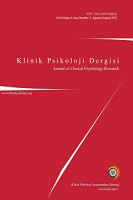Romantik bağlanma ve çift uyumu arasındaki ilişkide duygu düzenleme güçlüğü ve reddedilme hassasiyetinin aracı rolü
Mediating roles of emotion regulation difficulties and rejection sensitivity in the relation between romantic attachment and couple adjustment
Author(s): Zahide Tepeli Temiz, F. Işıl BilicanSubject(s): Social psychology and group interaction, Personality Psychology, Behaviorism
Published by: Klinik Psikoloji Araştırmaları Derneği
Keywords: couple adjustment; romantic attachment; rejection sensitivity; emotion regulation; mediation analysis;
Summary/Abstract: According to the attachment theory, relationships in early developmental stages provide a basis for emotion regulation skills and a pattern for rejection sensitivity. These early experiences also create a tendency for specific attachment styles in adulthood. Attachment shapes and maintains adjustment between couples. The current study aimed to examine the relationship between attachment, emotion regulation, and rejection sensitivity, which are thought to determine couple adjustment. Another aim was to investigate the mediating effects of rejection sensitivity and emotion dysregulation. The participants consist of 346 married individuals living in the city of Istanbul (Nfemale = 173, Nmale = 173). Findings regarding the path analysis show that the avoidance dimension of romantic attachment and the difficulty in emotion regulation negatively predicted the dyadic adjustment. The findings of the mediation analysis revealed an increase in attachment anxiety amplified the difficulty in emotion regulation and that decreased adjustment between the couples. Emotion regulation difficulty fully mediated the relationship between anxious attachment pattern and couple adjustment. Anxiety and avoidance dimensions of attachment were associated with increases in rejection sensitivity. However, rejection sensitivity did not have a direct or indirect effect on couple adjustment. In conclusion, the findings showed early structures continued to influence romantic relationships in adulthood. Based on the findings, therapeutic interventions to regulate emotions were expected to contribute positively relationship quality of couples.
Journal: Klinik Psikoloji Dergisi
- Issue Year: 6/2022
- Issue No: 2
- Page Range: 142 - 156
- Page Count: 15
- Language: Turkish

